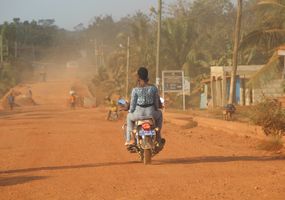E-Micromobility in Ghana (EmmGH)
The population and prosperity of the Republic of Ghana is growing. With the economic development, the demand for mobility services is increasing, which exists mainly for cars and mopeds. At the same time, these vehicles cause and add to high environmental pollution, which creates opportunities for more environmentally friendly alternatives through e-mobility. However, in order to improve the environmental impact, it is important that the energy required for supply is obtained from a renewable source.
Despite the positive economic development, unemployment and especially youth unemployment is both a societal and political problem in Ghana. The problem is particularly pronounced in the formal sector where economic growth across board has not translated into increased number of jobs. It is therefore prudent to look at solutions that cover the needs of mobility, energy access and supply whiles having a positive impact on employment. This represents the areas of intervention which are covered by the E-micromobility in Ghana project.
The E-micromobility in Ghana project aims at finding solutions to growing mobility demands and environmental stress by deploying solar charging stations and smart mini-grids to charge electric cargo bicycles and electric-scooters as well as makerspaces on the project site Kwame Nkrumah University of Science and Technology, Kumasi, University of Energy and Natural Resources and the Tema Export Processing Zone. The project further aims at commercializing the electromobility to a large population with a focus on job creation, knowledge transfer and private sector promotion.
To lower the environmental impact of the mobility sector, the sharing system of light electric vehicles must be scaled up and be broadly accepted by the population. As a starting point for up-scaling the project would be first replicated on the areas of the partnering universities (KNUST and UENR). Here the universities themselves would provide the mobility offer to students, staff and visitors, making it possible to develop a suitable business and to create the necessary job positions for administering and managing the sharing system. When replicating the project at the university sites, long term benefits can be gained. Students already get in touch with the topic of sustainable technology design. Many will go on to implement such innovation on their own or bring these to the industries solidifying the knowledge transfer envisioned. Alongside the implementation of the shared e-vehicle mobility offer workshops, classes, student exchanges, thesis research, guest lecturing can also take place between the three partner universities on the topics on sustainable mobility and development.

Contact

Project information
- Duration: 01.07.2021 to 31.12.2022
- Subject area: circular economy, environmentally friendly mobility
- Funding focus: pilot and model projects abroad
- Funding reference : VN 81274624
- Funding provider: Bundesministerium für wirtschaftliche Zusammenarbeit und Entwicklung (BMZ)
- Implementing Organizations: Pan-African Mobility Alliance (PAMA), Deutsche Gesellschaft für internationale Zusammenarbeit (GIZ)
- Destination country: Ghana
- Funding amount : € 145.513,00
News

News
Research trip to Ghana

